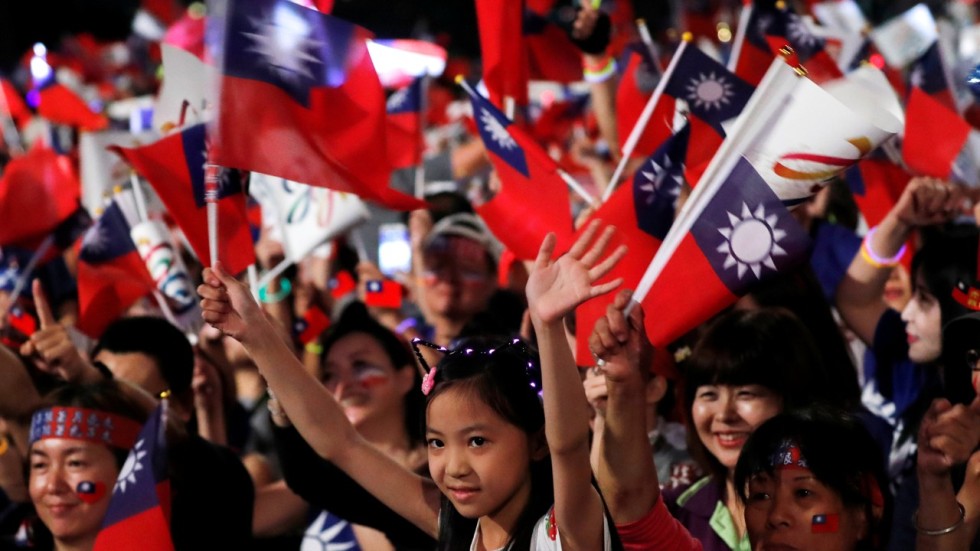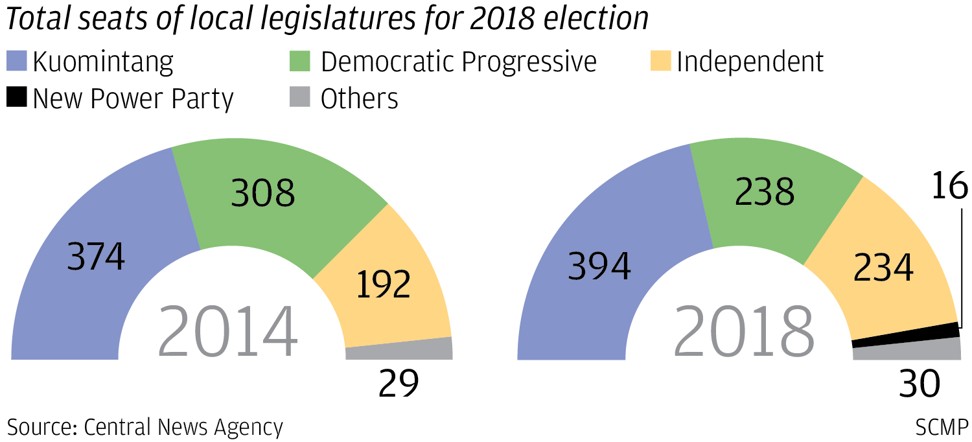
The huge defeat of Taiwan’s ruling Democratic Progressive Party (DPP) in the island’s local elections on Saturday cannot be interpreted as Taiwanese endorsement of the pro-Beijing stance of its rival Kuomintang (KMT), voters and analysts said.
In the latest nine-in-one elections, Kuomintang mayoral candidates won in Taiwan’s three largest cities – New Taipei City, Taichung and Kaohsiung, which has been the pro-independence Democratic Progressive Party’s (DPP) power base for two decades.
For all the 912 local legislature seats across Taiwan, KMT gained 20 to pocket 394 seats, while DPP lost 70 seats to hold 238.
But candidates outside the two political parties won 280 seats in the local legislature, up from 221 from the last election in 2014, when the total number of seats was 903.
In the capital Taipei, Ko Wen-je – the city’s independent mayor and one of the most popular politicians in the self-ruled island – narrowly won re-election against Kuomintang opponent Ting Shou-chung.
Ting refused to accept the result and took the case to court, asking for the election to be invalidated.
Cross-strait relations have been tense since 2016 when the DPP’s Tsai Ing-wen became president. Beijing responded by poaching Taiwan’s diplomatic allies and demanded Tsai accept the 1992 consensus, which says both Taiwan and the mainland belong to one country but both sides could have different interpretation about what is China.
The DPP and Tsai have blamed Beijing for posing a threat to Taiwan’s democracy.

But some voters have said they cared more about the candidates’ capabilities than their political background, even though cross-strait ties are worsening.
In the past two years, Tsai’s domestic reform initiatives, from the island’s pension scheme to labour laws, have proved unsuccessful.
Tsai vowed to improve worker benefits by giving employees two mandatory days off per week, plus seven statutory holidays.
But, in amending the labour bill, the DPP-dominated legislature not only tried to axe the seven statutory holidays, but also wanted to allow just one fixed day off, giving employers the option of asking employees to work on the other “rest day”, for which they would be paid overtime.
Mark Chen, 31, who voted for Ko, said he favoured capable candidates who could outline feasible plans to relieve people’s real concerns.
“I don’t think we can interpret from KMT’s big win in this election that Taiwanese are trusting KMT more. Rather, it’s because the DPP did so badly after Tsai became the island’s president. The DPP government cannot fulfil its promises,” Chen said.
“I am not influenced by the downward spiral of cross-strait relations, although Beijing did use some administrative measures to punish Taiwan, such as limiting tourists. The mayoral election is more inwardly focused,” said another man surnamed Chan, 30, in Taipei.
Another voter, surnamed Yen, said mayoral elections need not take cross-strait ties into consideration, since that’s a matter for presidential elections.
In the island’s south, people voted for KMT rising star Han Kuo-yu, previously head of a Taipei-based farm produce marketing association, who was described by news media as a “vegetable vendor”.

Han’s grass roots background is believed to have resonated with residents in the port city of Kaohsiung. Analysts said Han was not seen as a traditional KMT politician with close ties with the party top leadership.
His election manifesto said he would make Kaohsiung an attractive city so that young people would not have to go to Taipei for jobs.
“People voted for the candidate, not the political party behind him,” said Chang Wu-ueh, a diplomacy and international relations expert from Tamkang University in Taiwan.









